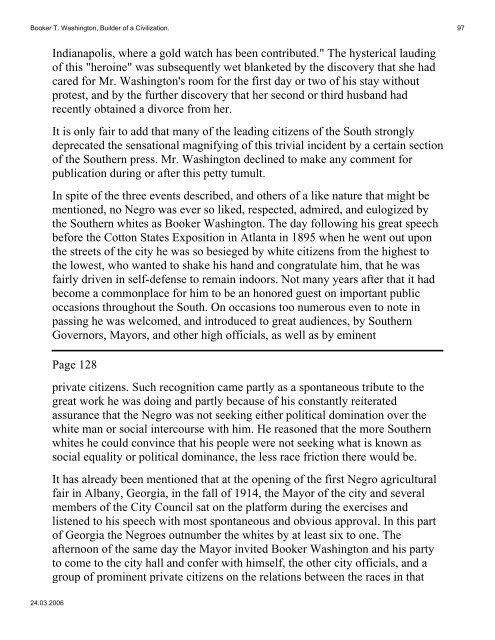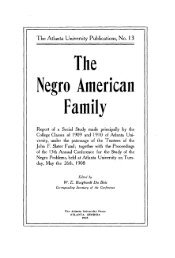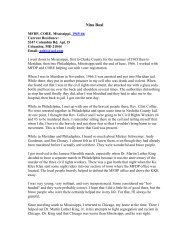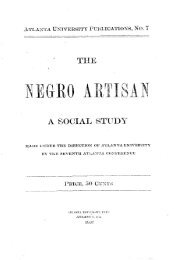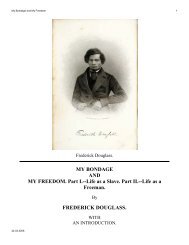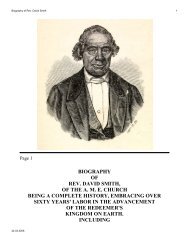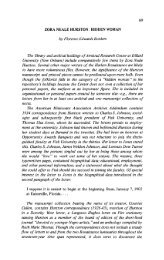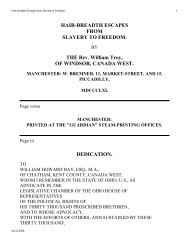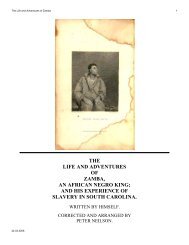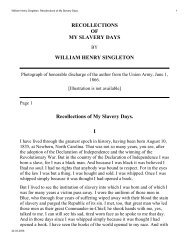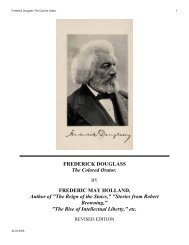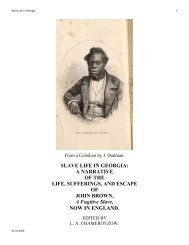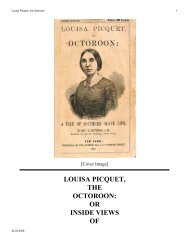Booker T. Washington, Builder o - African American History
Booker T. Washington, Builder o - African American History
Booker T. Washington, Builder o - African American History
You also want an ePaper? Increase the reach of your titles
YUMPU automatically turns print PDFs into web optimized ePapers that Google loves.
<strong>Booker</strong> T. <strong>Washington</strong>, <strong>Builder</strong> of a Civilization. 97<br />
Indianapolis, where a gold watch has been contributed." The hysterical lauding<br />
of this "heroine" was subsequently wet blanketed by the discovery that she had<br />
cared for Mr. <strong>Washington</strong>'s room for the first day or two of his stay without<br />
protest, and by the further discovery that her second or third husband had<br />
recently obtained a divorce from her.<br />
It is only fair to add that many of the leading citizens of the South strongly<br />
deprecated the sensational magnifying of this trivial incident by a certain section<br />
of the Southern press. Mr. <strong>Washington</strong> declined to make any comment for<br />
publication during or after this petty tumult.<br />
In spite of the three events described, and others of a like nature that might be<br />
mentioned, no Negro was ever so liked, respected, admired, and eulogized by<br />
the Southern whites as <strong>Booker</strong> <strong>Washington</strong>. The day following his great speech<br />
before the Cotton States Exposition in Atlanta in 1895 when he went out upon<br />
the streets of the city he was so besieged by white citizens from the highest to<br />
the lowest, who wanted to shake his hand and congratulate him, that he was<br />
fairly driven in self-defense to remain indoors. Not many years after that it had<br />
become a commonplace for him to be an honored guest on important public<br />
occasions throughout the South. On occasions too numerous even to note in<br />
passing he was welcomed, and introduced to great audiences, by Southern<br />
Governors, Mayors, and other high officials, as well as by eminent<br />
Page 128<br />
private citizens. Such recognition came partly as a spontaneous tribute to the<br />
great work he was doing and partly because of his constantly reiterated<br />
assurance that the Negro was not seeking either political domination over the<br />
white man or social intercourse with him. He reasoned that the more Southern<br />
whites he could convince that his people were not seeking what is known as<br />
social equality or political dominance, the less race friction there would be.<br />
It has already been mentioned that at the opening of the first Negro agricultural<br />
fair in Albany, Georgia, in the fall of 1914, the Mayor of the city and several<br />
members of the City Council sat on the platform during the exercises and<br />
listened to his speech with most spontaneous and obvious approval. In this part<br />
of Georgia the Negroes outnumber the whites by at least six to one. The<br />
afternoon of the same day the Mayor invited <strong>Booker</strong> <strong>Washington</strong> and his party<br />
to come to the city hall and confer with himself, the other city officials, and a<br />
group of prominent private citizens on the relations between the races in that<br />
24.03.2006


